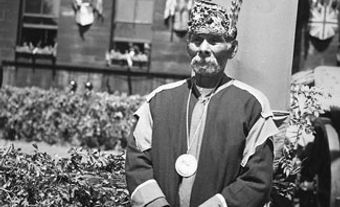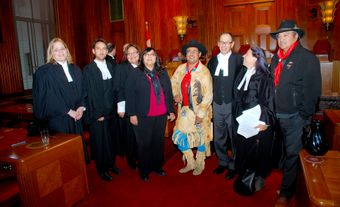Elsipogtog (pronounced El-see-buk-tuk) First Nation is a Mi’kmaq community about 91 km northwest of Moncton, New Brunswick. Known for many years as Big Cove, in 2003 the First Nation officially changed its name to Elsipogtog, meaning “river of fire.” However, they are still commonly referred to as Big Cove. Community members largely speak Mi’kmaw and English.
As of 2021, Elsipogtog has 3,509 registered members, 2,703 of whom live on the First Nation’s reserve. The reserve, also known as Elsipogtog, is still referred to as Richibucto 15 in some official documents. It encompasses 19.56 km2.
History
The Mi’kmaq have lived closely with the land since their creation by Creator. There is evidence of Mi’kmaq settlements in existence over 5,000 years ago along the Richibucto River, according to the Atlantic Policy Congress.
When the French, later known as the Acadians, settled in the area they relied heavily on the Mi’kmaq for their survival. In addition, the Mi’kmaq aided French settlers in conflicts with the British Crown. Between 1725 and 1779, the British signed a series of treaties with the Mi’kmaq, Wolastoqiyik, Abenaki, Penobscot and Passamaquoddy. Known as the Peace and Friendship Treaties, the agreements contained no monetary or land transfer provisions. Instead, the Indigenous signatories promised they would no longer fight the British, and in turn the British promised that the Indigenous signatories would continue to have access to the land and resources.

According to Mi’kmaq Elder Jane Meader, the Mi’kmaq were a strong military force in the region and forced concessions out of the British Crown, ensuring the Mi’kmaq way of life would not be disrupted.
But early and often the Mi’kmaq faced land theft and had their land sold by the colonial government. In 1802, 51,200 acres were set aside for the Richibucto tribe, now known as Elsipogtog. By 1900, the tribe had just 2,222 acres and today holds only 4,833.9 (19.56 km2).
Aboriginal Title Claim
In 2016, Elsipogtog First Nation and Kopit Lodge, a grassroots Mi’kmaq organization, filed an Aboriginal title claim with the governments of New Brunswick and Canada. The claim applies to Sikniktuk, one of seven districts in Mi’kma’ki (the Mi’kmaq’s homeland). Sikniktuk includes a portion of Nova Scotia as well as the southeast corner of New Brunswick, from the Bay of Fundy north to the Miramichi River, and from the Saint John River east to the Northumberland Strait. The plaintiffs contend that they never surrendered the land, arguing that they maintained Aboriginal title after signing one of the Peace and Friendship Treaties in 1761. In 2019, the Elsipogtog band and Crown-Indigenous Relations and Northern Affairs Canada signed a Memorandum of Understanding. The memorandum indicates a willingness on both sides to negotiate Aboriginal title and the management of the environment and natural resources in Sikniktuk.
Shubenacadie Residential School

Like First Nations across the country, the effects of the Indian Act, implemented in 1876, debilitated Elsipogtog. The community was subjected to residential schools, Indian day schools and the Sixties Scoop. Children from Elsipogtog attended Shubenacadie Indian Residential School, located in Shubenacadie, Nova Scotia. The only residential school in the Maritimes, Shubenacadie operated from 1930 to 1967.
In 2013, Elsipogtog First Nation dedicated a monument to community members forced to attend the Shubenacadie Residential School. The monument is just outside the band office near the corner of Big Cove Road and Main Street.
On the girls side of the monument the names are as follows:
- Alice Augustine (Sanipass)
- Doreen Augustine (Peters)
- Lena Augustine
- Yvonne Marie Augustine (Torrey)
- Joanne Clair
- Margaret Ann Dedam (Peters)
- Sarah Simon (Francis)
- Laura Sanipass
- Barbara Ann Peters Nee Simon
- Marilyn Simon (Ingram)
- Annie Bella Augustine (Levi)
- Gertie Augustine
- Phyllis Marie Augustine (Bernard)
- Elizabeth (Liza) Augustine
- Veronica Copage (Daulton)
- Linda Marie Francis
- Helen Sanipass
- Madeline Sanipass
- Caroline Joan Simon
- Martha Simon
On the boys side the names read:
- Allan Joseph Edward Augustine
- Frank Kenneth Augustine
- John Augustine
- Joseph Henry Augustine (Joe Bee)
- Sam (Bald Eagle) Augustine
- James (Jimmy) Clair
- Raymond Copage
- Roger Dedam
- Joseph Andrew Francis
- Michael William Francis
- Philip Francis Jr.
- Clement Paul
- Stephen Sanipass
- Bryant Joseph Simon
- Wayne Solomon
- Clifford Augustine (Peters)
- Frank S. Augustine
- John Freeman Augustine (Noel)
- Louis Augustine
- Stephen Augustine
- David Copage
- Arnold Dedam
- Fenton Francis
- Joseph Gabriel Francis
- Philip Francis Sr.
- Andrew Paul
- Frank Paul
- Alexander Bruce Simon
- Francis Stephen Simon (Clifton)
On the rear of the monument, space was made to honour residential school survivors from nearby Indian Island First Nation: Garfield Barlow, Grace Brooks, Gloria Jean Knockwood and Vincent Knockwood. Joseph James Julian from Indian Brook is also listed.
Missing and Murdered Indigenous Women and Girls
Elsipogtog First Nation is involved in raising awareness about Missing and Murdered Indigenous Women and Girls. In 2020, the Rick Hansen Foundation awarded Milee Millea, an Elsipogtog First Nation member and student at Rexton Elementary School, the Rick Hansen Foundation Difference Maker of the Year award. Millea overcame her shyness to deliver a speech to fellow students about Missing and Murdered Indigenous Women and Girls, winning a debate competition.
Many families in the community are still seeking justice for their loved ones and continue to grieve in their own way. A national, independent support line is available at 1-884-413-6649.
Infrastructure
On Elsipogtog’s reserve there is a grocery store, the River of Fire Market, a Pharmasave, an economic development centre, and a newly constructed child and family building. The First Nation is also in the process of constructing a new school, set to open 2021. The community hall is located at the corner of Big Cove Road and Ball Park Street and the entrance is in the shape of a teepee.
In 2021, Elsipogtog First Nation won the Kraft Hockeyville Canada prize, which comes with an opportunity to host an NHL game and $250,000. The community plans to use the money to rebuild the community rink at Chief Young Eagle Recreation Centre. The arena was named after long-serving Chief Albert Levi, who died in October 2020.
Governance

Elsipogtog First Nation is a member of the Mi’kmaq Grand Council. The grand council is a traditional form of government and once ruled where families could hunt and fish, while also handling relations with other nations. In terms of local governance, the community elects a local chief and council through the First Nations Elections Act. Elections take place once every four years.

Arts and Culture
Elsipogtog First Nation is a Roman Catholic community, but has seen a resurgence of people practising Mi’kmaw spirituality. The Sundance is hosted annually near the Elsipogtog Lone Eagle Treatment Centre grounds. The Sundance is a Plains Indigenous peoples ceremony performed in honour of the sun. William Nevin is the local Sundance Chief. With the help of Siksika Elder Keith Chiefmoon, Nevin brought the Sundance to Elsipogtog in an effort to combat drug and alcohol abuse.

Elsipogtog has a rich sports tradition with the likes of Everett Sanipass, a former Chicago Blackhawks forward, inspiring many young athletes. In addition to hockey, Elsipogtog produces many fighters, including Stephen “Spider-Man” Clement (MMA) and Nathan “Timberwolf” Millier (boxing). The late Alfred Sanipass was four-time New England Golden Glove Champion and a Canadian Boxing Hall Fame inductee.
Powwow drum group Wabanaki Confederacy, featuring drum keeper Donnie Augustine from Elsipogtog, won an Indigenous Music Award for Journey of the Drum in 2019. In 2021, the group won album of the year at the Summer Solstice Indigenous Music Awards for Honouring Our Languages.


 Share on Facebook
Share on Facebook Share on X
Share on X Share by Email
Share by Email Share on Google Classroom
Share on Google Classroom



